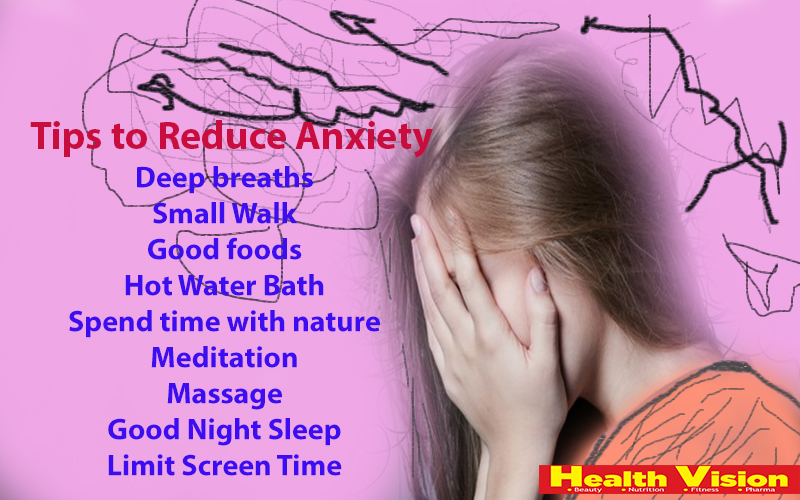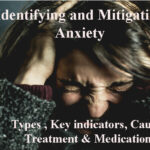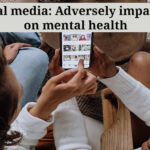Anxiety disorder can make one’s life very difficult and even affect concentration at home, job, school, exams or anything you do in your daily life. It could take a toll on physical, mental, and emotional well-being.


Most of us at one point of the day worry or feel anxious about something or another thing. It might be about an exam, job interview, illness, home chores, or anything else. It is quite normal to worry as it is a part of one’s life but worrying persistently and excessively about anything could take a toll on physical, mental, and emotional well-being.
Chronic stress and worrying can be one of the major symptoms of Generalized Anxiety Disorder, a very common anxiety disorder that involves stress, tension, anxiety, worry, and negative thinking that can make one’s life very difficult and even affect concentration at home, job, school, exams or anything you do in your daily life.
SYMPTOMS
Excessive stress and anxiety can take a serious toll on physical, emotional, and mental health or wellness. A few common symptoms include –
1. Persistent Headache
2. Insomnia
3. Body ache
4. Irritation
5. Lack of concentration thus decreases productivity
6. Nausea
7. Palpitations
8. Fear
9. Trembling
10. High blood pressure
11. Unwanted thoughts
12. Increased negative thinking
13. Nervousness
14. Feeling tired or restless most of the time.
TIPS TO MANAGE ANXIETY
A few tips to feel calm and manage anxiety –
1.Deep breaths and Small Walk
One of the easiest ways to reduce anxiety immediately is to go for a walk either with your favorite person or your headphones with your favorite music on. Long-term exercise or walking release feel-good chemicals and reduce emotional outburst thus producing calming effects.
When anxious, your breathing pattern changes, it becomes rapid and irregular. Take some deep breaths to reduce anxiety thus decrease in blood pressure, and heart rate and ultimately calming the body and brain both.
2. Distracting Yourself
Distracting yourself or shifting your attention from an activity that is causing anxiousness is a must. Distraction would interrupt your negative thoughts and anxiousness both.
Indulge in an activity that could make you feel good such as cooking your favorite dish, binging on some favorite comedy show, talking to your favorite person, painting, or reading your favorite novel or book.
3. Intake of foods that help in reducing food
Various foods help in reducing anxiety naturally such as green leafy vegetables, Apples, Berries, and Legumes. These foods improve the quality of life with various health benefits and are even beneficial in lowering anxiety levels.
4. Hot Water Bath
Hot water or sauna bath reduces anxiety and relaxes the body. A hot water bath enhances mood, producing a calming effect. You could also pamper yourself with good tea/coffee/fresh juice as per your mood after that.
5. Spend time with nature
Keeping yourself busy in some or another thing reduces anxiety to an extent. If you are free and feeling anxious due to running negative thoughts in your mind spend time with nature. Sitting in the garden, enjoying nature, or doing gardening lowers heart rate, anxiety attacks, and stress hormones.
6. Complimentary treatments like Meditation , Massage
Anxious every time? Try some meditation and good massage on daily basis. Meditating daily for at least 5 – 10 minutes helps in reducing anxiety and improving general and mental well-being.
According to Mayo Clinic reports, massaging for 60 minutes reduces stress hormones up to 30 percent after just one session.
7. A Good Night Sleep
To beat anxiety, try to maintain a regular schedule of going to bed, even on weekends or holidays. Try to forgo napping after 3 p.m so that you could be able to sleep well and early at night.
8. Limit Screen Time
Phone, T.V, and laptops emit light that keeps your brain awake and interrupts sleep. Checking emails, scrolling applications, and binging Netflix most of the time till late at night trigger anxious thoughts and thus anxiety. Thus it is important to limit your screen time the entire day. Calm your brain by reading some good books or listening to soothing music before sleep to reduce anxiety.
Conclusion
On the final note, I would like to add that with these tips you are not able to manage or control your anxiety, Ask for expert advice or help from your doctor or counselor. Anxiety is treatable, so consider and trust yourself, your doctor, and the process.


Dr Jyotsana Anand Suri
Certified medical content writer
Email: jyotsana789@gmail.com











